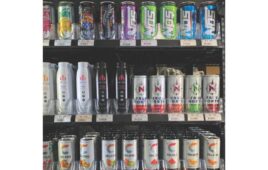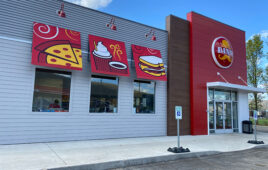
Metro Petro Gas, courtesy of Mia Lambert
In the days that followed the killing of George Floyd by a police officer on May 25, protests erupted across the country calling for justice, not only for Floyd but for others before him.
Protests continued throughout the weekend, from Minneapolis to New York to Cleveland and beyond, sometimes leading to violence or property damage, including convenience stores and other businesses.
” … the senseless death of George Floyd and the ensuing violence of the last few nights has shattered more than storefronts; it has broken the fragile confidence of a nation already struggling with anxiety, frustration and fear,” said Retail Industry Leaders Association (RILA) President Brian Dodge in a statement.
Dodge called on retailers to stop the spread of hate and fear with the same determination that they’ve been using to fight COVID-19.
“Retailers are proud to be an incredibly diverse industry filled with talented people from all walks of life, and we are ready to help lead the rebuilding and healing,” he said.
In Minneapolis
Minneapolis, where Floyd was killed, was likely hit the hardest, causing c-store chains large and small to shut their doors.
Casey’s General Stores temporarily closed a few of its stores over the weekend in Minneapolis and St. Paul, Minn., said Director of Communications Katie Petru, as well as adjusted its hours in accordance with local curfews.
“We continue to monitor the situation in our communities and will make decisions with our team members’ safety first,” said Petru.
Mia Lambert, who owns Minneapolis-based Metro Petro Gas with husband Clay Lambert, said the chain closed its doors on Thursday. They removed registers, moved all tobacco products and propane off-site, emptied and opened safes and ATMs and boarded up doors and windows.
Compared to other businesses in the area, the store has had minimal damage, Lambert said, save for some permanent graffiti.

another c-store in Minneapolis, courtesy of Mia Lambert
Metro Petro reopened Monday morning, with plans to operate under minimal hours and board up its windows and doors each night.
“There are so few gas stations now down here that we had to get a fuel delivery already because it’s been so busy,” said Lambert. “All we did was take down the plywood from the front door today and turn the gas back on.”
But the store has been short-staffed, and sales had been down 70% due to the COVID-19 pandemic.
“A lot of our customers come from the University of Minnesota, and they completely shut down, and everything went online,” said Lambert. “Even though the stay-at-home order in Minnesota expired on May 18, we saw zero increase in our business after that.”
Fortunately, Metro Petro was able to secure some relief from the bank on the mortgage as well as some money from the Paycheck Protection Program (PPP).
Despite much uncertainty, Lambert said the kindness of its customers and support from fellow retailers remain a bright spot in dark times.
“Our customers have just been very nice today,” she said. “They’re glad we’re here. We’re glad they’re here.”

Metro Peto Gas, courtesy of Mia Lambert
And Beyond
Despite having a location in downtown Chicago, Mario Spina, owner and CEO of Parent Petroleum, which operates St. Charles, Ill.-based The PRIDE Stores, said none of his stores were damaged.
“We closed the site early and beefed up our security overnight,” said Spina. “We hire off-duty police officers.”
Meanwhile, Raymond Huff, President of HJB Convenience, which operates Russell’s Convenience stores in Denver, Los Angeles, San Francisco, Honolulu and Detroit, said his stores have been greatly affected by protests and subsequent traffic restrictions.
“On Friday at 11 a.m., The City of Denver stopped public transportation into and out of downtown. We closed our stores by 1 p.m. and put our employees in Ubers to get them home or drove them,” said Huff.
Stores reopened Monday with corporate staff. Fortunately, because Russell’s Denver stores are located in high-rise office buildings, none were damaged. But one of its Los Angeles stores had a close call.
“Protesters were able to get in and damage the business next to our location, (but) they were apprehended prior to breaking into our store,” he said.
Huff sees a common thread in the protests and the COVID-19 pandemic: lack of federal guidance.
“First COVID-19, that is now going into week 12, and now the protests,” said Huff. “Where is the leadership to guide us as a country, versus what we are seeing — every state, county and city on their own?”
He believes both could have been mitigated by early leadership from the White House.
“A well-timed speech from the White House may have quelled the protesters,” said Huff. “They are no longer protesting the killing of Floyd, but an expression of the failure of the federal government to lead us for better or worse.”
Black Lives Matter
Companies large and small have been responding to the protests in different ways. On Monday, bp Chief Executive Officer Bernard Looney published his message to its global staff on LinkedIn.
He urged employees to call out any sort of discrimination or harassment and outlined what those at the company can do, including acknowledging Americans’ pain, listening to each other and living its purpose.
“ … We should be prepared to ask ourselves tough questions about how bp stacks up,” Looney said. “Are we living by our values at all times? Are we doing everything we can to create truly inclusive and respectful workplaces?”
Chicago-based Foxtrot posted a message to its customers on social media and said it would be donating to Black Lives Matter.
“It is easier to not speak up in uncomfortable times. But staying silent is not an option on the matter of injustice,” the company said. “Each and every one of us has a role to play in fighting these injustices and building a better community. Today, we are making a donation to Black Lives Matter. But we have more work to do and we are committed to being part of the change.”
Des Moines, Iowa-based Kum & Go also took to social media to voice support for the Black Lives Matter movement.

twitter.com/kumandgo
The next day, the c-store chain took its support a step further with a statement from Chairman and CEO Kyle Krause.
“ … I stand with our Black Associates, Customers and Communities. I kneel alongside them, too,” said Krause. “However, acknowledging that Black Lives Matter is only the beginning.”
Krause said he will donate $25,000 to the Center for Constitutional Rights, an organization committed to addressing the structural and systemic nature of racism in our society.
Ultimately, he called on himself, his stores, the industry to step up and do more.
“ … Our stores and businesses serve hundreds of thousands of people each day,” he said. “Are we doing all we can to make sure our Black Associates and Customers feel safe? Feel welcome? We will do more.”




